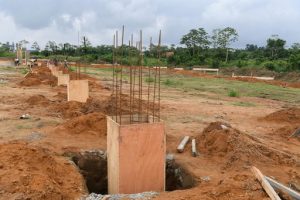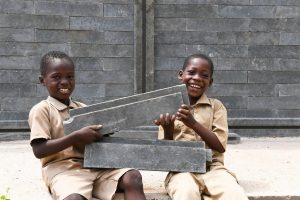
Building schoolrooms from plastic waste in West Africa
Canadian Plastics
Recycling SustainabilityConceptos Plasticos, a Colombian non-profit group, has partnered with UNICEF to collect plastic waste in the West African country of Côte d'Ivoire and turn it into modular plastic bricks to build classrooms.
For all the handwringing lately about plastic waste, it does have its uses.
Case in point? Conceptos Plasticos, a Colombian company that recycles used plastics into alternative construction materials, has partnered with the United Nations Children’s Fund, or UNICEF, to collect plastic waste in the West African country of Côte d’Ivoire and turn it into modular plastic bricks to build much-needed classrooms.
Conceptos Plasticos and UNICEF recently broke ground on a first-of-its-kind factory that will make the easy-to-assemble, durable, low-cost bricks. “This factory will be at the cutting edge of smart, scalable solutions for some of the major education challenges that Africa’s children and communities face,” said UNICEF executive director Henrietta Fore. “Its potential is threefold: more classrooms for children in Côte d’Ivoire, reduced plastic waste in the environment, and additional income avenues for the most vulnerable families.”

Construction of the first plastic bricks factory in Western Africa in Youpougon, a suburb of Abidjan, the capital of Côte d’Ivoire.
Photo Credit: UNICEF/Frank Dejongh
Côte d’Ivoire needs no less than 15,000 classrooms to meet the needs of children without a place to learn. In certain areas at present, some kindergartens are forced to house as many as 100 pupils. The recycled plastic, collected from polluted areas in and around the coastal city of Abidjan, will be used to build an estimated 500 classrooms for more than 25,000 children over the next two years. Nine classrooms have already been built in the towns of Gonzagueville, Divo, and Toumodi using plastic bricks made in Colombia, demonstrating the viability of the construction methods and materials.
The project certainly doesn’t lack for waste material: More than 280 tonnes of plastic waste are produced every day in Abidjan alone, UNICEF said, and only about five per cent is recycled – the rest mostly ends up in landfill sites in low-income communities.
Once it’s fully operational, the factory will recycle 9,600 tonnes of plastic waste a year. Conceptos Plasticos and UNICEF will pay residents to collect plastic waste of all varieties, and additives will then be added in a process that blends and heats the material. The melted plastic is then molded into interlocking bricks that can be slotted together for easy installation without the need of an adhesive.
The fire-resistant bricks are 40 per cent cheaper, 20 per cent lighter, and will last hundreds of years longer than conventional building materials, UNICEF said. They are also waterproof, well insulated, and designed to resist heavy wind.

Students showing off plastic bricks at their new school in Sakassou, in the centre of Côte d’Ivoire.
Photo Credit: UNICEF/Frank Dejongh.
While the plastic schools effort is starting in Côte d’Ivoire, there are plans to expand the effort into other nearby countries “and potentially beyond,” UNICEF said. “This project is more than just a waste management and education infrastructure project,” Fore said. “It is a functioning metaphor – the growing challenge of plastic waste turned into literal building blocks for a future generation of children.”
